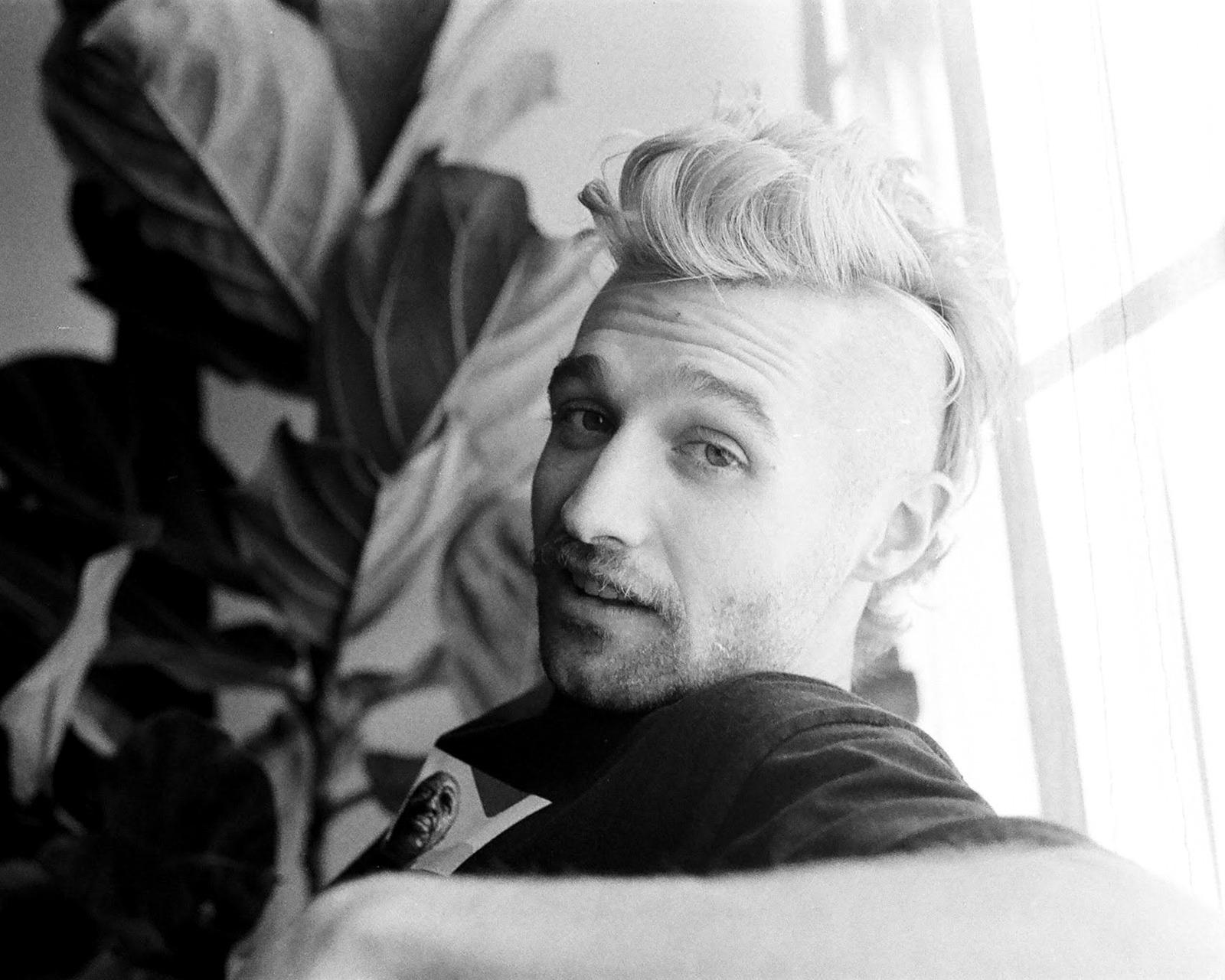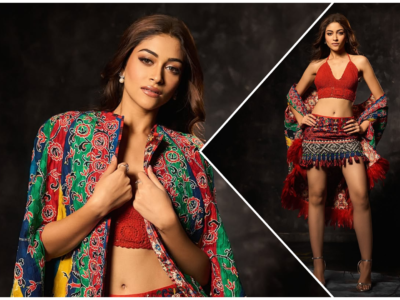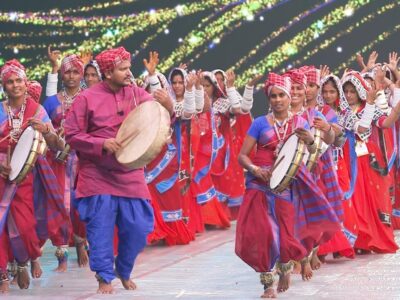“At the time I was photographing mostly my friends who are also wheelchair users and people with disabilities. There’s just not a lot of photos of my community and I actually didn’t know this because I was so new to photography” – Nolan Ryan-Trowe, an renowned Photographer and story teller – shares his journey
Meet Nolan Ryan-Trowe, a multidisciplinary artist from California, a 2024 Light Work Artist in Residence. His works are published in The New Yorker, The New York Times and The Nation, and feature in the permanent collections of The Museum of Fine Arts, Houston and The Museum of the City of New York. FridayWall caught up with him during his visit to India for the Global Ability Photography Challenge as part of the Indian Photo Festival 2023
What do you usually like to take photographs of?
Usually, I am photographing my friends, and my family, and myself, and just other people who are in my community. But then, recently, I have also been photographing nature, like trees, landscapes. It’s really like..I will photograph anything that I think is related to the bigger story of my life as an artist. As I think, as I have gotten further and further into photography and art, I have come to realise that it’s really all connected in a way. Sometimes I take pictures of things, and not really know why, at first. And once I see it, and look at it with other pictures, it makes more sense with the story. It’s interesting. I think, sometimes I will look at light and shadow and be inspired just by the way something looks. Or an emotion I have. If I am looking at something, I feel something, I want to take a photo of. Yeah, it can really vary from people, places, things. Really anything.
You are drawn to things that you feel are connected to your life, to the story of your life. Are you into existentialism?
Yeah, very much. I am very much into existentialism. The sort of inter-connectedness of it, who I am as a person. Just the consciousness of being on this planet, and how that relates to art. I think art is my expression of who I am, or I guess, how I feel, not so much of who I am. Maybe there is some connection between what I feel and who I am.
How did you begin pursuing photography professionally?
It was when I went to New York city to graduate school to get my Master’s Degree, which was not in photography. My degree was more sociology based, in Humanities. I took a photography class during my studies. I sort of did it more and more and more. I met some people who really encouraged me to keep going, and telling stories. Because at the time I was photographing mostly my friends who are also wheelchair users and people with disabilities. There’s just not a lot of photos of my community and I actually didn’t know this because I was so new to photography but I had some mentors who kinda pointed that out to me. This was back in 2017. That’s when I kinda started. I had some really good mentors who helped me get published. I had a publication in The New York Times when I was fairly new to photography. It was just encouraging for me to sort of get the affirmation early on—“oh, we like what you are doing, it’s important.” So, I just started there. I sort of kept going and going. I don’t know…I guess I will just keep going till I can.
So, this is what you do most of your time—how do you spend your time?
I like to write a lot. (What do you write about?) I guess it’s similar to my photography in a way. You know, it could be about…I guess I find myself writing a lot about home, where I grew up, people I grew up with. I think more of that community before I had a disability. I just finished writing a manuscript of a memoir—a story of my life. That’s obviously before my injury and after my injury. Often, I find myself really writing about people I love, in my life, and how their lives have woven with mine, sort of the bigger journey in that regard. And then, just poetry, which isn’t really about any one person or one place. Sometimes I have this feeling that I can’t really express through my photography. So I have to write about it. The abstract things, the more existential, I can communicate that with photography sometimes. I feel like there are times I can only really do it through writing. I sometimes combine writing with photographs. I will overlay text over image, so they can relate to each other. Most of the time is not spent photographing. It’s actually not that much time. It was, when I lived in New York, it was all I did. Now I go through phases where I take pictures everyday for two months, then I might not take pictures for a month. It just varies. I find, most consistently, I am writing.
Do you like telling stories?
Hm..mmm..
Did you see yourself as an artist before your injury also, or was this something that came into your awareness later on, or developed?
I don’t think I saw myself as an artist. I think I just saw myself as a writer. I guess writers are artists. But in my head, I really didn’t make that distinction so much. My mom is really artistic. She was always painting, or drawing. She took a lot of photos in my family. She is the one who actually bought me my first little camera. So, I think I was always artistic. I was doing paintings, drawings, or writings. I always kept a journal from the time I was a really little kid. I don’t really know if I saw myself as an artist. Even now, I feel like that word is kind of vague. I don’t even really know sometimes what it means to be an artist. I don’t even know how you can define that, because, you know, I think life is art in a way. Like how you live life can be artistic. It has nothing to do with a camera, or painting, or anything. Just the way you go through life can be very artistic and beautiful. Even if you are just doing something outside of what is considered as art—there are great chefs who are artists, people who are bus drivers who drive buses in a really artistic, beautiful way. The way you can move through the world can be artistic. I think life is creativity. You sort of have to be creative to make it through and survive, I think.
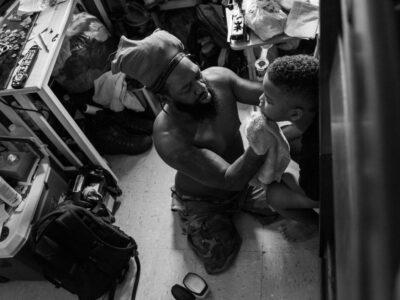
Nolan’s friend cleaning his son’s chin, a normal moment of care between a father and son
If we zoom into a moment that you feel like capturing, can you describe to me, what would make you capture a scene or a moment.
I think lately, it’s just been when I really feel a strong emotion. I think love, honestly. I think when I look at most of my favourite pictures, they are really intimate. Whether it’s like families, or friends, or people hugging, or even just photos I have taken of myself, that I think are more vulnerable. Sometimes, I will be out with people, I will see kind of a really intimate thing happening, or a moment (does it have to be rare, or beautiful) No, it doesn’t have to be rare. Even so mundane. Like one of the photographs which I took which is up in the exhibition is my friend cleaning his son’s chin. It’s just so normal. It’s a dad taking care of his son. I remember waking up and seeing that, and feeling like “wow, it’s so beautiful to me”, or the other one, where my friend, his partner is pregnant, she is sitting on his lap, there is nothing really rare about that. There’s just this instinct, where I feel something about that, whether it’s beautiful, or intimate, or I think I just tend to be attracted to those moments where people are expressing love, or caring for each other. That’s what has been really important to me in my life. Personally, even before photography, I have always been drawn to people who really have empathy, and who are caring people, and who take care of one another. I think that’s what drives a lot of my inspiration to capture a scene if I see that.
What is your process—do you take multiple shots and pick the best?
When I first started, I took a lot more pictures. First, because there was a digital camera. It was kind of unlimited. Like your phone, you could take 100 pictures in a minute if you want. I felt I really had to do that, to learn. Just the repetition of making a picture and looking through a camera thousands of times. When you see those pictures in the exhibit, there are 10 pictures on the wall, but there are thousands of pictures I took. So there is definitely an intense filtering process that happens. It happened a lot more back then. And then recently, I have been shooting on analog film, there’s negatives. It’s more time consuming. It costs more money. I have to be careful with how I shoot it. I process it in my house. I have a dark room, in the red light you put through the chemicals. That’s kind of my process now. It’s very slow. I am really not taking multiples anymore. When I was younger, I would take 10 shots of the same thing. But now, I feel comfortable enough when I look at something, and frame it how I want, and take 1 shot, maybe 2. It has changed a lot.
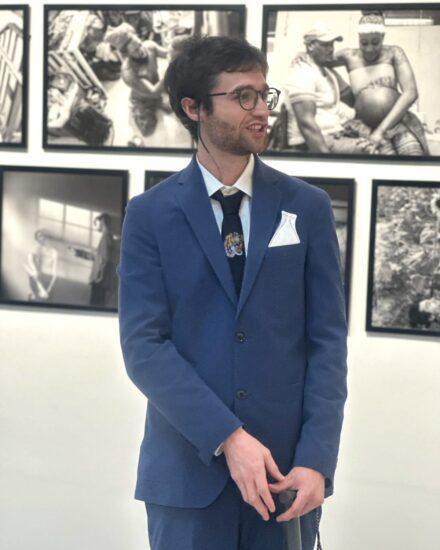
Nolan talking to his audience at the Global Ability Photography Challenge at the Indian Photo Festival 2023, to a backdrop of his works on the wall
When you are in your phase of taking pictures—do you have a routine? Or do you always carry your camera with you?
I always have some camera on me. It’s funny, I mean, my phone has a camera. So there’s always that. I don’t really have a routine. I have a lot of different cameras—so some cameras are portable. I have one on me. I have this other camera which is really big, it takes 20-30 minutes just to take a picture. It’s a whole set up. Some days I just feel like I want to use that camera, for no reason really. Sometimes I want to shoot black and white. Other times, I want to photograph in colour. It’s so weird. The other day, I was walking in my backyard, and all of a sudden, I felt like “oh man, I want to take pictures”, and I ran inside, and got my camera and shot a whole roll of film, and hadn’t planned to do that. It was very spontaneous.
How much of your work is spontaneous? Do you also do planned, theme-based stories through photography?
I would say most of it is spontaneous, even when it is planned. Sometimes I will plan—my partner Jackie and me—we make a whole set up, with a backdrop, and I will say “oh, you know, like, I have this idea”, and we will just kind of start taking pictures. Sometimes, I have a specific idea, it’s usually only one picture that I have a specific idea about, and there are these extra shots, those are spontaneous. Even if I know I am going to a protest or a demonstration, that part of it is planned, but I don’t know what’s going to happen once I get there. I can do my best to plan, but even in those kinds of situations, it’s still spontaneous.
Does this ever happen—you are going through life, you see something nice, and it sticks with you, but you didn’t have your camera with you, or you weren’t able to capture it, what do you do?
Actually, sometimes I purposefully don’t take pictures. Sometimes, I just want to experience it. I have actually been doing that more lately. I think it’s why I don’t photograph all the time anymore, because I was actually starting to feel that the camera was getting in the way of life. I would see something and take a picture. It was all the time. I was obsessive to the point where I was like “what’s the point?” I am here to experience things and enjoy life. I don’t have to document every single thing I see that I feel is beautiful or I think is interesting. I think there’s some beauty in the temporality of things. That things aren’t permanent. It’s just as important that you don’t photograph, as when you do. Sometimes, I will just purposely leave my camera at home. I don’t even want to think about it. I just want to live.
Any artists that you look up to, or whose work you admire?
A lot of my friends really inspire me. My friend Kyle, I grew up with him. He is a skateboarder. He is also into drawing. I think it goes back to when I was saying before that the way you live can be very artistic. My friend Kyle, the way he lived his life is so beautiful to me, he is just such a unique person. I have other friends. We hang out. They are just themselves. They are not trying to be anyone else. That to me is so inspiring. I have another friend Ben. He lives in Los Angeles. He is really weird. He is super spontaneous. He doesn’t care about what other people think at all. That’s very inspiring to me. Another friend who does stuff like that, just another person out there, he is a great photographer. I am really inspired less by what they make, and more by who they are. Even Jackie is inspiring to me. She lives her life in a really unique way. I feel like she is not trying to be anybody else. She makes what she wants to make, expresses herself the way she wants to. I think people who do that are the best. It just makes me want to be more like myself.
Because the thing is that no one is totally original. I think everyone starts off trying to emulate someone, or something they saw, because it’s recognised as good, and they want to have affirmation. I think it’s really awesome. Now I am at this point, very much due to my friends, and family, where I don’t care anymore, not in a bad way, I just feel free, and when I am around people who are free, like in their head, mentally, that’s the best for me. I can talk to them. I think a lot of people are into artists who are dead and gone, people you don’t really know. And that’s cool. There’s definitely work out there which is by famous artists, but I don’t feel as inspired by it because when I am making art with my friends, we can have a dialogue directly about it. I think that’s the most inspiring thing when I can make something and show it to them, and they can make something and show it to me, and it’s real. It’s not something I saw on TV. This person I know exists. It’s tangible.
As an artist, do you have a vision for the future of your work, or the impact of your work?
I guess I am open to whatever happens. I think I have ideas of what I want to do, or what my work could be, but it never really works out that way. I kind of have given up mostly on having expectations. Sometimes, I have expectations, it works out. Like I never thought I would be here…I don’t know…I just hope that whatever I make comes from a real place, and that I am able to express myself honestly, and that comes through in work.
Why is it important to you to express yourself honestly?
I think that’s the only thing that makes me feel alive. I think it’s the hardest thing to do. To really feel like I put it all out there, and to leave nothing back, and to try to connect, that’s hard to do. I don’t do it that often, I don’t think. It’s sort of just an aspiration that I have, that keeps me driven. I think that’s why it’s so important to me, because that’s what gets me up and out of my bed everyday. If I didn’t have that, I wouldn’t know what to do. I think most of my life, I felt really misunderstood, and judged by a lot of people. So I feel this need to express myself in the most honest way, because it feels like I am reconnecting with myself.


